In this review of Court judgments, we look at Supreme Court’s observation that delay in appeal being decided cannot be a reason for inadequate sentence, non-disclosure of relevant information being a criterion for cancelation of employment. We also look at Allahabad High court’s observation on weapon’s discovery not being the only criteria for conviction and Kerala High court’s direction to State regarding a wrong implication.
SC: Reiterates that Non-Disclosure of Material information itself could be ground for Termination of services.
In the case Union of India vs. Dillip Kumar Mallick, the Supreme Court Bench comprising of Justice Dinesh Maheshwari & Justice M.M Sundresh has reiterated that non-disclosure of material information itself can be a ground for cancellation of employment or termination of services.
In this particular case, Dillip Kumar Mallick was appointed under the Centre Reserve Police Force (CRPF) Group Centre, Bhubaneshwar in 2003. A department inquiry was initiated against him on the allegations that he has concealed information about him being involved in a criminal case and being charge-sheeted. The case was pending before the competent Court but the information was not provided while filling up the verification roll. The Disciplinary authority awarded the punishment of removing him.
Allowing a writ petition, the Orissa High court had directed the CRPF to impose lesser punishment as deemed just and proper. The issue was raised in an appeal before the Supreme Court if the High Court was justified in interfering with the quantum of punishment awarded.
Referring to another case, Avtar Singh vs Union of India (2016), the Bench made the below observations:
- Non-disclosure by itself may be a ground for an employer to cancel the candidature or terminate services
- The employer would not be obliged to ignore such defaults and shortcomings
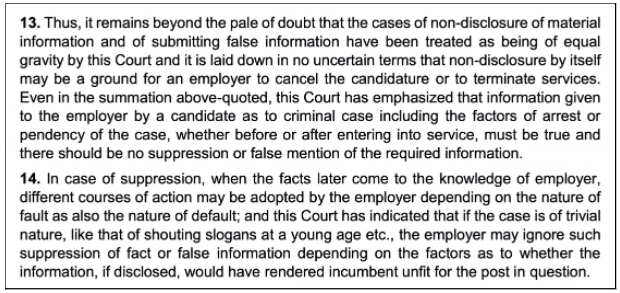
The bench further noted that Orissa High Court has affirmed the finding of the Disciplinary Authority and the Appellate Authority that Dillip Mallick was held guilty of misconduct of suppression/concealment of material information.
The bench allowed the appeal and stated that there is no legal basis for the court to interfere and direct the employer to impose any lesser punishment since the facts do support the allegation that the relevant information was voluntarily suppressed.

SC: Inadequate sentence cannot be imposed merely because of a long time lapse in deciding an appeal
Supreme Court Bench comprising of Justice MR Shah and Justice BV Nagarathna observed that a long time-lapse in deciding an appeal cannot be a ground to award an inadequate or disproportionate punishment.
In the case State of Rajasthan vs. Banwari Lal, the Rajasthan High court has partly allowed a criminal appeal by maintaining the conviction of the accused for an offence under IPC Section 307 but the sentence was reduced from three years of rigorous imprisonment to the period already undergone by him in confinement. The high court considered the submissions on behalf of the accused, that the occurrence took place about 26 years ago and he was facing trial for the last 26 years.
The State appealed to the Supreme Court. The bench observed that the High Court has dealt with the appeal in a casual manner and that the judgment is against all the principles of law laid down by the apex court in various decisions.

The bench further pointed out that they have come across several judgments of different High Courts where the criminal appeals were disposed of in a cursory manner and by adopting short-cut methods. The Supreme Court bench stated that merely because a long period has lapsed by the time the appeal is decided, cannot be a ground to award an inadequate or disproportionate punishment.
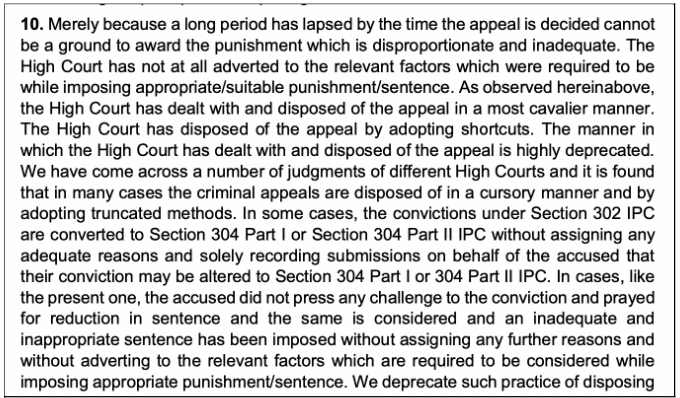
Allahabad HC: Weapon discovery alone is not enough to prove guilt
In the case Chatthoo Chero vs. State of U.P, Allahabad High court observed that while the discovery of the crime weapon at the disclosure of the accused is important as per Section 27 of the Indian Evidence Act, such disclosure alone would not lead to the conclusion that the accused committed the offence.
The bench comprising of Justice Suneet Kumar and Justice Dinesh Pathak set aside the life sentence of a murder-convict in this case, stating that the accused cannot be convicted based solely on the strength of the recovery of the crime weapon.
As per the case details, an FIR was lodged by the complainant against unknown persons for the murder of his wife. As per the statement, the family including the wife retired to sleep in the night after dinner. In the morning, their son saw his mother i.e., the complainant’s wife lying dead with blood all over.
During the interrogation, the complainant confessed to having committed the offence at about 3 AM in the morning using an axe. He informed the Investigating Officer (IO) of the place where the axe was hidden. The axe was recovered, and the accused was taken into custody.
Forensic lab report found human blood on the axe, blanket, cord of cot, blouse, and broken piece of glass bangles. Considering the statement of the witness, the documentary evidence, recovery of the weapon and the presence of human blood on the axe along with the clothes and accessories of the deceased, the trial court was of the opinion that the prosecution had proved the charge beyond a reasonable doubt. Accordingly, the accused was convicted and sentenced to life. The accused challenged the same and moved to the court.
The Court proceeded to find out if the prosecution was able to prove the offence and link the accused to the offence. It observed that:
- The room of the deceased is accessible to any person adjacent to the road and is surrounded by open land, to which the door opens.
- Since the room of the accused and the room of the deceased are not interconnected, the accused has to reach the room via the outside of the house.
In this context, the Court concluded that the prosecution has not been able to establish a link i.e., the presence of the accused at the time of committing the offence and failed to prove that the accused alone had access to the room of the deceased.
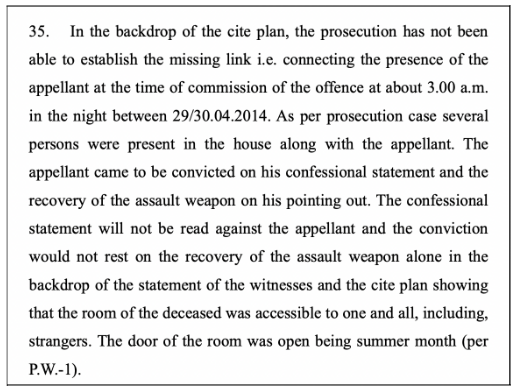
Regarding the murder weapon, the court stated that this alone cannot form the basis of conviction. It noted that the recovery of the crime weapon was made after five days and had not been linked with the commission of the offence.
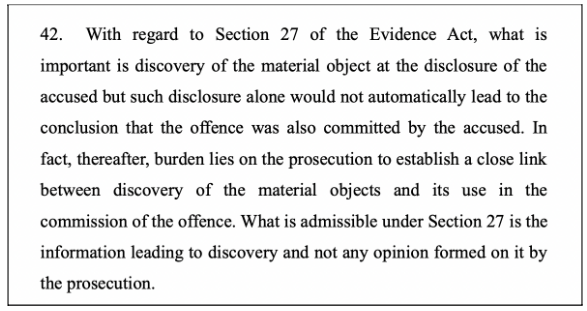
The Court concluded that the finding reached by the trial court was not based on legal evidence. It proceeded to set aside the order of conviction and the sentence and directed for the accused/appellant to be released.
Kerala HC: Directs State to pay Rs. 2.5 lakhs to two persons for falsely implicating and detaining them.
Kerala High court directed the State government to pay Rs. 2.5 lakhs each to two persons who were falsely implicated and kept in confinement for over 50 days.
In the case of Anil Kumar A.B vs State of Kerala & Ors, Justice P.V.Kunhikrishnan observed that false implication and illegal confinement is an infringement of the fundamental right guaranteed under Article 21 of the Constitution and in such circumstances, the Court should step in and compensate the aggrieved party.
The petitioners were arrested and kept in confinement for more than 50 days in connection with two separate Abkari cases. They were subsequently found to be innocent and absolved of the charges by the investigating agency.
The advocates representing the petitioners have sought compensation from the State for infringement of their fundamental rights under Article 21. The argument was put forth stating that the petitioners’ personal liberty was illegally restrained by the officials and hence the State is required to pay compensation to the petitioners.
However, the government asserted that it was not responsible for paying compensation as the action was only a dereliction of the duty on part of the excise officials, on whom appropriate disciplinary proceedings are already being taken.
The Court noted that since infringement of fundamental right is established, it should not limit itself by mere declaration but proceed further to provide compensatory relief under public law jurisdiction for breach of public duty by the State for not protecting the fundamental right to life.
It observed that it was clear in the present case that the enquiry officer has falsely implicated the petitioners and that no further evidence was necessary to determine the violation of Article 21.
The court further stated that the State is bound to pay compensation and that amount should be recovered from the persons responsible for illegal confinement.
It further, stated that compensation cannot be fixed in tune with the mental trauma of the implication. The state was required to pay Rs. 2.5 lakhs to each petitioner. The court further made certain observations regarding the cases booked under Abkari crimes.
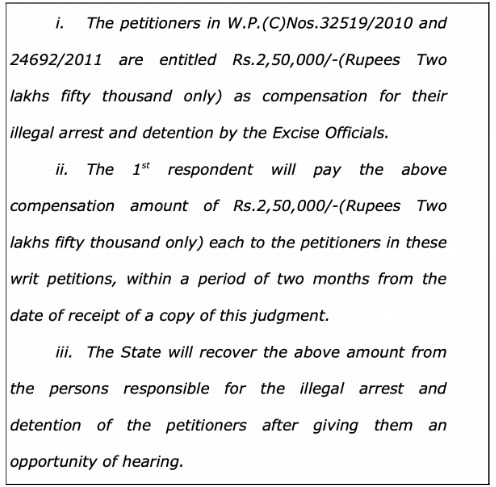
SC: Consumer Courts can direct builders to give refund & compensation in case of failure of delivery of apartments
In the case of Experion Developers Pvt Ltd vs. Sushma Ashok Shiroor, Supreme Court stated that Consumer Courts can direct builders to refund the home buyers in case they fail to deliver the apartments as agreed.
In this case, the National Consumer Disputes Redressal Commission (NCDRC) directed a Developer to refund Rs. 2.06 crores with an interest of 9% per annum to the consumer in view of its failure to deliver possession of the apartment within the stipulated time.
The builder made an appeal for the following issues:
- Whether the terms of the Apartment Buyers Agreement amount to unfair trade practice and
- Whether the commission has the power to direct refund of the amount deposited by the consumer with interest.
Regarding the first issue, the Bench comprising of Justices UU Lalit, S. Ravindra Bhat and PS Narasimha, upheld the NCDRC’s finding that the clauses of the agreement are one-sided, and the consumer is not bound to accept possession and seek a refund.
Regarding the second issue, the court held the view that the consumer courts can grant relief to flat buyers who are aggrieved.
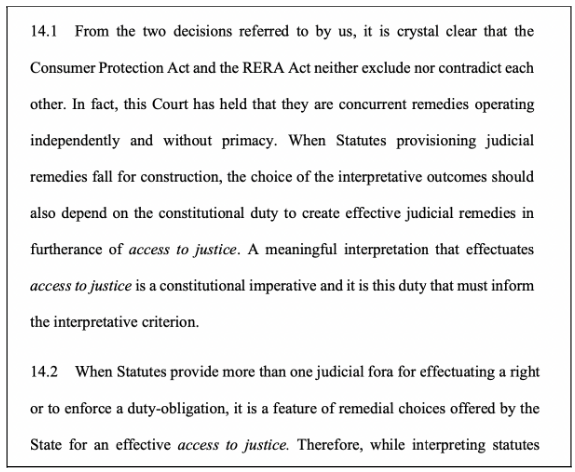
The bench referred to Section 14 of the Consumer Protection Act and dismissed the appeal filed by the developer.
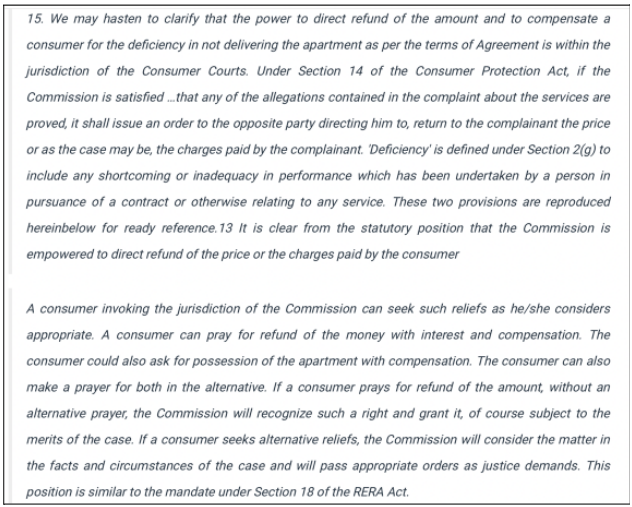
Featured Image: Review of Court judgments


